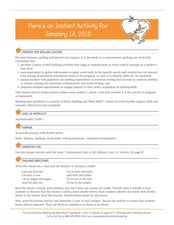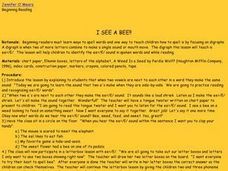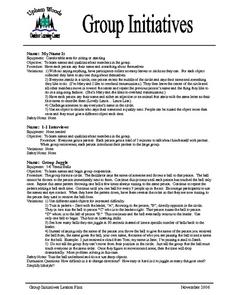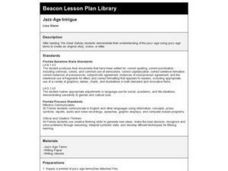Curated OER
Try a Money Bee for a "Change"
Students take the spelling bee format and adapt it to provide practice in making change and work on their money skills. They simulate the process of making purchases with money and making change as necessary to complete the purchase.
California Academy of Science
The Heat is On: Cause and Effect and Climate
The higher the number of letters in the final word for the National Spelling Bee, the higher the number of people killed by venomous spiders. Obviously, those two facts correlate, but no causation exists. Scholars view data based on...
Curated OER
Drum Roll, Please!
Drill and practice phonemes, letter formations, written language, vowel correspondences, as well as consonant correspondences with youngsters. They will locate and identify the /b/ in written and spoken words from flash cards containing...
Curated OER
Spelling With Double Letters
Students practice spelling words with double letters. In this spelling lesson, students read a rhyme chorally and identify the words with double letters. Students complete a instant activity worksheet to practice spelling their words...
Curated OER
I See A Bee
Students create a drawing of a word containing the sound /ee/. They are introduced to the /ee/ vowel pattern that comprise the long /ee/ vowel sound. They practice listening for and reading a variety of words containing the long vowel...
Curated OER
Meet Lee, the Sleepy Bee
First graders distinguish between the different ways to create the sound for long vowel e. They are introduced to the vowel patterns that comprise long vowel sounds. They practice reading and spelling a variety of words containing the...
Curated OER
Dolch Homophones
In this effective language arts lesson, students study homophones and practice using the correct words as they fill in the blanks to sentences. Sentence ideas are provided in the lesson, as is a very nice 35-page booklet of language...
Curated OER
Create Your Own Homophone Worksheets
Students develop their own homophone worksheet. They practice the spelling and using the different homophones. They participate in a homophone bee to end the lesson.
Curated OER
Ow! That Hurts
Students study the ou=/ow/ correspondence in written and spoken words using a tongue twisters and a letterbox lesson. They recite the tongue twister and make given words using the letterboxes. Next, they listen to a read aloud of Audrey...
Curated OER
Big Bellies and Dandy Duffs
Students practice tracing and identifying lower-case b and d letters as well as pictures containing examples of those letters. They mimic the sounds that the letters make and offer examples of those sounds rhyming when applicable.
Curated OER
Jobs
Students discuss jobs that could make you happy or unhappy and read articles about people who are happy and unhappy in their jobs. In this jobs lesson plan, students also match jobs to things they work with.
Curated OER
Group Initiatives
Students explore the names and qualities about members in the group. They each say their name and something about themselves. Students gather around in a circle. They listen to the teacher as he or she says the name of someone and throws...
Curated OER
Food Dictionary - Harvest Festival
Students explore healthy foods and dictionary organization. Students create a list of healthy foods. They construct their own food dictionary, with illustrations. Students model how a dictionary page should be filled with a picture,...
Curated OER
Jazz-Age Intrigue
Eleventh graders read The Great Gatsby and explain the jazz age. They use jazz age terms to create their own short story, scene, or letter.















